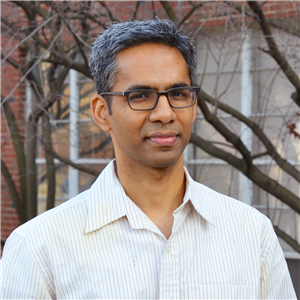Graduate Student Seminar
September 29, 2023
12:00 p.m. ET
Scaife Hall 105
September 29, 2023
12:00 p.m. ET
Scaife Hall 105
Crystal interfaces exist in diverse materials systems in the form of grain/phase boundaries (GBs) in three-
dimensional polycrystals and as heterointerfaces in two-dimensional (2D) heterostructures. Interfaces signifi-
cantly influence the mechanical response of a material as observed in phenomena such as superplasticity and creep in polycrystals and the much sought-after electromechanical coupling in 2D materials that is responsible for correlated electron physics. Recognizing interface dislocations as the primary carriers of interface plasticity, our overarching goal is to build a statistical mechanics model for heterointerfaces that connects the discreteatomic structure to interface continuum properties, such as energy and mobility.
Enumerating all line defects in arbitrary heterointerfaces is the first step towards building a statistical model. To this end, we will present a unified mathematical framework to enumerate all interface dislocations in 2D heterostructures, and disconnections (dislocation with a step) in rational GBs. Our framework is driven by the Smith normal form (SNF) for integer matrices which enables us to systematically explore the bicrystallography of interfaces. Analogous to the definition of a bulk dislocation, which relies on the translational symmetry of a 3D lattice, the framework characterizes a heterointerface’s translation symmetry, which is integral to the definition of interface dislocation. Central to our framework are two lattices — the coincident site lattice (CSL) and the displacement shift complete lattice (DSCL) — derived from the two lattices that constitute an interface. The constructive nature of the framework lends itself to an algorithmic implementation based exclusively on integer matrix algebra.
Next, we will demonstrate the calculation of nucleation barriers of the enumerated line defects in GBs and a large-twist (> 10◦) bilayer graphene. We conclude by showing how the resulting energetics of individual
line defects can be aggregated in the form of ensemble averages to arrive at thermodynamic and kinematic
properties of heterointerfaces.

July 22 2025
10:00 AM ET
Materials Science and Engineering
"Artificial Intelligence Enabled Quantification of Defects in Stainless Steel 316 L parts printed via Binder Jetting," presented by Pooja Maurya
6142 Scott Hall
July 25 2025
3:00 PM ET
Materials Science and Engineering
"Enabling High-Voltage Cathode in All-Solid-State Batteries," presented by Young-Geun Lee
2327 Wean Hall
July 29 2025
11:00 AM ET
Materials Science and Engineering
Graduate Programs Information Session
Learn more about the master's and doctoral programs in materials science and engineering at CMU.
July 30 2025
10:00 AM ET
Materials Science and Engineering
"The Data Driven Discovery of Singlet Fission Materials," presented by Siyu Gao
2327 Wean Hall
August 13-15 2025
Materials Science and Engineering
Workshop on Methods for Three-Dimensional Microstructure Studies
The workshop is intended for researchers at all levels and will combine presentations on 3D microstructure science as well as practical presentations on the tools and methods for reconstructing, analyzing and synthesizing.
Scott Hall 5201 (Bosch Sparks Conference Room)